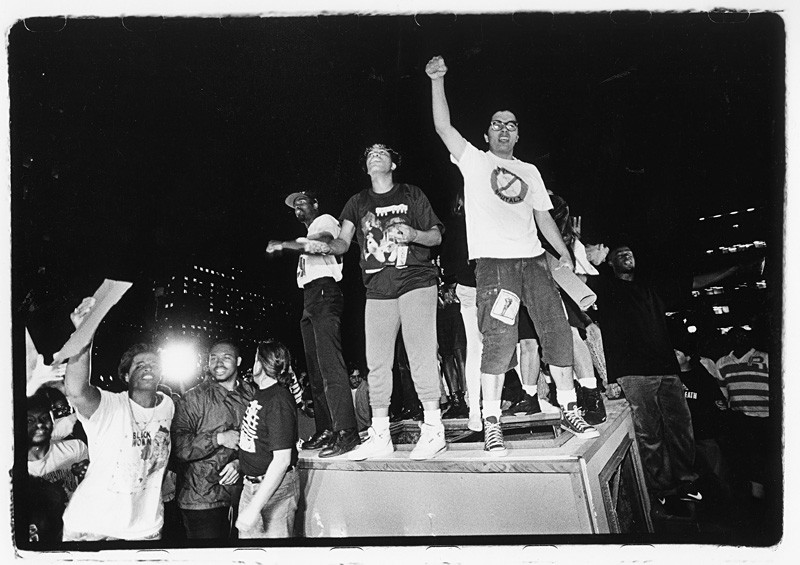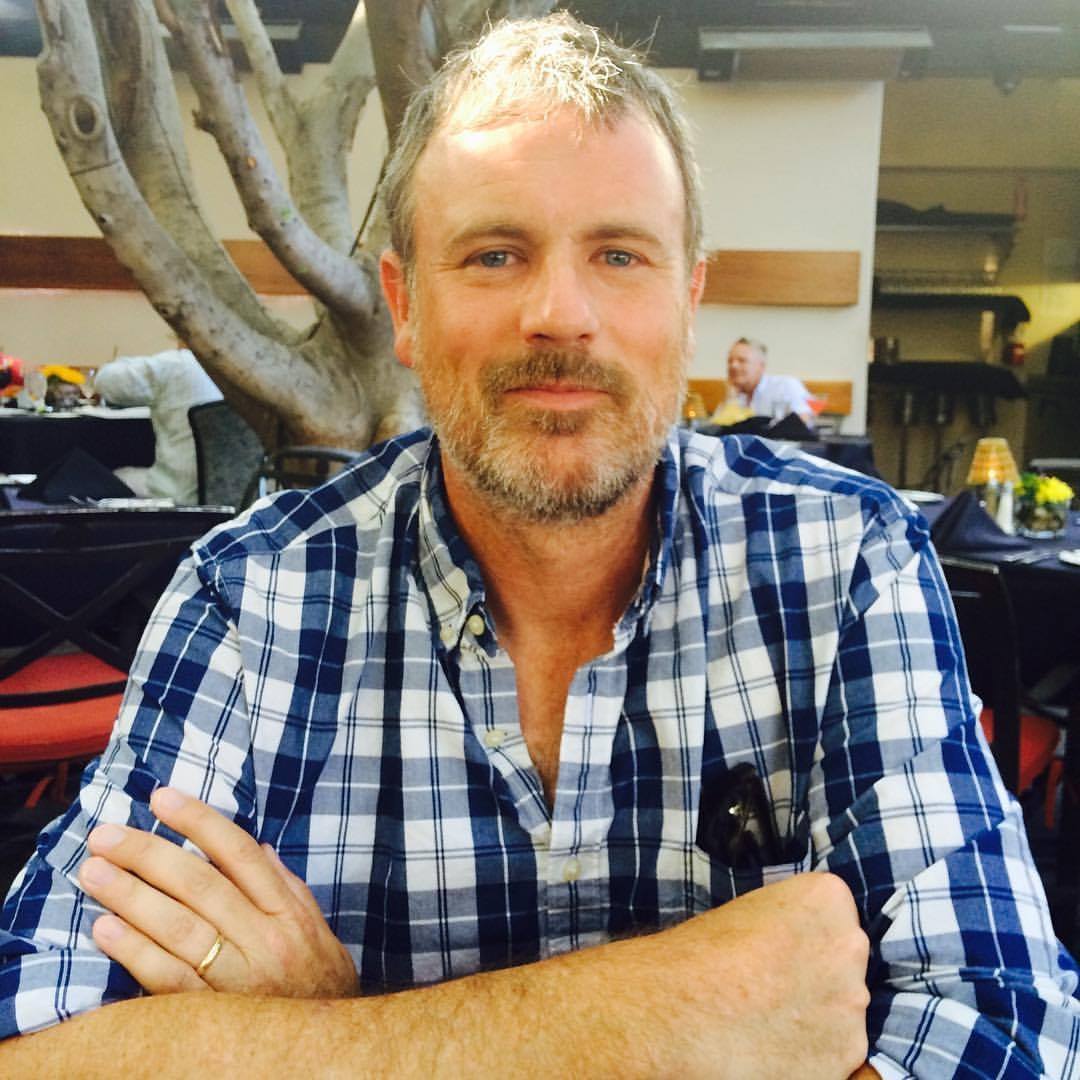
I didn't know my role in the LA Riots had been captured on film until a decade ago, on the 10th anniversary of the event. I was sitting on the couch of the Huntington Beach duplex I lived in with my then-girlfriend, watching MSNBC's nightly news report, when Brian Williams stopped talking and the screen shifted to a shot of downtown Los Angeles on April 29, 1992, and the image of a young man in a black T-Shirt, olive-drab cargo pants and Doc Martin boots trying to kick in a glass door.
I remember the cameraman standing to my right, patiently rolling tape while I kicked the glass, which wouldn't break, and how, eventually, a friend of mine threw a metal garbage can at the door; it bounced off, rolling harmlessly onto the sidewalk.
I was a senior about to graduate from Occidental College, a private school located on a leafy campus just 15 minutes but a few worlds away in Eagle Rock. My friend and I were members of a select group of thrill-seeking student activists that viewed itself as the vanguard of a coming revolution.
We organized fellow students to protest against the Persian Gulf War and apartheid in South Africa; we lobbied in support of unionizing hotel workers. We haunted campus quads and picket lines in garish African National Congress and Justice for Janitors T-shirts, and at nights, we smoked weed in our dorm rooms, listening to N.W.A or the Grateful Dead while quoting Mike Davis and Antonio Gramsci.
On the first night of the riots, we arrived near Parker Center, the headquarters of the Los Angeles Police Department, just after sunset, parking illegally in front of a bank building on Bunker Hill a few blocks from the 101 freeway. By the time we found our parking spot, the protest we'd seen on television had morphed into a melee. The crowd outnumbered the baton-wielding, frightened-looking cops by four to one. It surged forward as though it were an angry wave, pelting the officers with eggs, bottles and debris. Abandoned police cruisers were swarmed, overturned and set ablaze.
We caught up with the mayhem at a 101 freeway overpass, where a flaming palm tree shot sparks in the air, resembling a Roman candle. Someone used the tree to light an American flag, and everyone cheered as it burned. The people gathered around the flames came in all varieties: a black dude with a Malcolm X cap who shouted into a megaphone, ACT-UP activists with bandanas and black-leather jackets who seemed in a rush to get somewhere, even a few white jocks wearing USC football sweat shirts and drinking Coors from the can as though the effigy before them were a homecoming bonfire.
Below us on the freeway, the traffic was at a standstill. Young Latinos with shaved heads and white wife-beater undershirts darted from car to car, slamming their fists on hoods, ripping unlocked doors from their hinges. Drivers sat helplessly, their hands frozen on their steering wheels.
As the tree-torching mob headed west, we encountered evidence of other wandering vandals: rows of knocked-over parking meters and overturned newspaper racks that had been smashed open so people could light the contents on fire. After a few blocks, we encountered an intersection at which a lost-looking elderly white couple, presumably trying to avoid the carjackers on the freeway, had driven their Cadillac down the wrong street at the wrong time. Someone hurled a chunk of concrete, shattering the rear windshield; people cheered as the car sped away.
My friend and I did our best to blend in with the crowd, feeling safety in numbers. But we tended to stick out. A middle-aged black woman in a nurse's uniform who was smoking a menthol cigarette handed me a newspaper she'd just set ablaze with her lighter. She smiled with crooked teeth as she handed over the torch. Somewhere overhead, a police helicopter hovered, shining a spotlight on the ground. A canister bounced onto the pavement, billowing purple smoke. I didn't stop running until I reached an intersection where debris had been piled in the middle of the street. Several dozen cops lined up with riot shields charged toward us. Everybody scattered. I was the first one running.
* * *
The next few days, during which the fires I helped light spread throughout the city, causing destruction and purifying nothing, are a blur in my mind. I recall driving past roving units of National Guardsmen on the way to a half-empty campus and overhearing irksome conversations between well-heeled white students who debated whether to take off to Malibu for the weekend, seeing as how there was less smoke in the air on the coast.
The morning after the rampage at Parker Center, our class valedictorian, a nice girl I knew from art class, accosted me as I stood in line for coffee. She wanted to know if my friend and I had happened to be downtown the previous night. She'd seen some news footage of the riots and thought she'd recognized us.
I made the mistake of sharing this information with friends on the second night of the riots, as we smoked a large joint on the roof of the Craftsman house in which we lived, an ancient abode straight out of Middle Earth that was situated on an overgrown hillside lot. We watched the helicopters circle above the fires that were still burning on the southern horizon.
My friend suffered his first and only nervous breakdown early that morning, shutting himself into his room for most of the next day, unable to speak. We never really talked about it, although occasionally we joked about how he'd suffered a “psychedelic freak-out.” I finally asked him about the episode a few weeks ago. He was at a loss to explain what had happened, except to call the experience a “head-on collision with the reality principle” that produced a “radical disjuncture” in his brain.
At the time, his mind simply couldn't grasp the vastness of his alienation from his social peers, people for whom what was happening on the streets was either only a nuisance or held absolutely no meaning at all. By the time I saw myself kicking that door via television 10 years later, I'd aged to the point it was actually exciting to realize the whole thing really was caught on camera. I managed to record the broadcast and eventually wore out the tape showing it to friends and family members, the youngest of whom only knew about the riots thanks to the Sublime song. I married my girlfriend and had a kid, who's 7 now and knows nothing of any of this.
Looking back to April 29, 1992, with the benefit of two decades of hindsight, one thought remains. The revolution my college friend and I had hoped to join by going downtown never happened, but we were just play-acting, anyways, pretending that what we were doing and what was happening was real.
It wasn't. Now we're half a lifetime older, and there's a new generation trying to sort out what it all means while we raise families and worry about our next paychecks amid a global, great depression. Time seems to be running out, and the world is falling apart just fine without us.
This article appeared in print as “Burning World: The LA Riots, 20 years later.”

Award-winning investigative journalist Nick Schou is Editor of OC Weekly. He is the author of Kill the Messenger: How the CIA’s Crack Cocaine Controversy Destroyed Journalist Gary Webb (Nation Books 2006), which provided the basis for the 2014 Focus Features release starring Jeremy Renner and the L.A. Times-bestseller Orange Sunshine: The Brotherhood of Eternal Love’s Quest to bring Peace, Love and Acid to the World, (Thomas Dunne 2009). He is also the author of The Weed Runners (2013) and Spooked: How the CIA Manipulates the Media and Hoodwinks Hollywood (2016).


Life is indeed a journey and an education , particularly for different generations in the same family. As I get older , I realize what a good thing that is, although living through it can sometimes be a challenge…